
Latin America is one of the world's most diverse linguistic regions, and yet indigenous language speakers are often marginalised by society.
A recent Oxfam study showed that Indigenous languages are a cultural marker that can have a very significant effect on the opportunities and social status of their speakers.
"These peoples accumulate centuries of abuse and dispossession, a social situation that begins in the colonial era, in which they are a socially subordinate ethnic group," said Patricio Solís, a Mexican sociologist and one of the authors of the report, explains to Euronews.
Many speaking parents of these languages prefer that their children abandon them and use only Spanish.
This means there are fewer speakers.
There is still hope for Aymara and Quechua which though vulnerable, have more than 400,000 speakers between Bolivia, Chile and Peru.
UNESCO estimates that of the 7,000 existing languages, 95% are indigenous, but they are disappearing quickly.
"The holders of these languages are not only leaders in the protection of the environment, but also their languages represent complex knowledge systems and must be recognized as a strategic national resource," says UNESCO.
UNESCO declared 2019 International Year of Indigenous Languages and committed to working with governments and Indigenous peoples.







